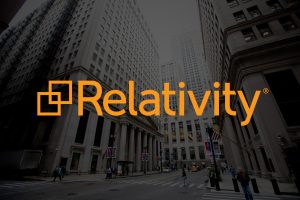Why kCura Is Changing Its Name To Relativity
The timing of the name change is curious.
 Today, leading eDiscovery software company kCura is changing its name to Relativity, the name of the platform currently used by 199 of the 200 Am Law firms (disclosure: Relativity sponsors many of the ReplyAll conversations I curate both here on Above the Law and on Bloomberg Biglaw Business). Software developer Andrew Sieja originally founded kCura in 2001 as a software consultancy and Sieja imagined building a complete suite of products and solutions, but things began to really take off several years later when they built Relativity for Foley & Lardner and retained rights to the IP. Relativity has since been their focus.
Today, leading eDiscovery software company kCura is changing its name to Relativity, the name of the platform currently used by 199 of the 200 Am Law firms (disclosure: Relativity sponsors many of the ReplyAll conversations I curate both here on Above the Law and on Bloomberg Biglaw Business). Software developer Andrew Sieja originally founded kCura in 2001 as a software consultancy and Sieja imagined building a complete suite of products and solutions, but things began to really take off several years later when they built Relativity for Foley & Lardner and retained rights to the IP. Relativity has since been their focus.
When I spoke with Sieja on Friday, he intimated that the rebranding was not an earth changing event, but simply a move that made sense and something that had been on the calendar since the start of the year. kCura had developed into a well known brand around Chicago (which became useful for recruiting top local talent), but ultimately, said Sieja, “Combining the two brands into one just makes sense.”
I have no reason not to take Sieja at his word. Those who know Sieja understand that these branding events are not the kind of thing that gets him excited, and, a hacker at heart, he would prefer to focus on product architecture and the engineering team. And, in all likelihood, this is purely a rebranding exercise and the PR folks at Relativity simply made Sieja available to the press (likely against his will) to help get the word out.

Early Adopters Of Legal AI Gaining Competitive Edge In Marketplace
But that’s not going to stop me from some good old fashioned reckless speculation.
I can’t help wondering if this isn’t Relativity laying the foundations to go public. To be clear, I have no insider information here, and, when I asked Sieja on Friday, he wouldn’t even “no comment” me.
But the timing of the name change is curious.
The company has been “kCura, developer of eDiscovery platform Relativity,” for so long, and that structure works for many companies so why change it? One of the clients I did work for as an associate was Hansen Natural, makers of Monster Energy. Although they eventually rebranded as Monster, they did very well as Hansen Natural. Plus, the market environment at the moment is positive for SaaS companies who want to go public.
Sponsored

Legal AI: 3 Steps Law Firms Should Take Now

Early Adopters Of Legal AI Gaining Competitive Edge In Marketplace

Navigating Financial Success by Avoiding Common Pitfalls and Maximizing Firm Performance

Is The Future Of Law Distributed? Lessons From The Tech Adoption Curve
There is always industry buzz about Microsoft buying Relativity, but there are a number of reasons that deal doesn’t make sense to me. One, Sieja bootstrapped the company for years before finally taking a $125 million mega round of funding in 2015. Not only did he and the other early founders likely get all the liquidity they needed out of the funding round, but they’ve also made more money than most people will make in a lifetime. Second, since starting Relativity, Sieja has not had a boss, and even if Microsoft (or another buyer) were to leave kCura as a stand alone company, I just don’t see them going that route. Third, eDiscovery is BIG and getting BIGGER. There are more customers and more use cases, but there are also more competitors both big e.g. Thomson Reuters, FTI, Recommind and smaller e.g. Logikcull, Everlaw & Disco. Public markets could be a good way to finance the next stage of growth and potentially swallow up competitors.
Stay tuned, because if my reckless speculation is indeed on the mark, an IPO would be a milestone moment for legal technology companies. Proving that a company that has marketed mostly to law firms can eventually go public will get the attention of the investment community as well.
Zach Abramowitz is a former Biglaw associate and currently CEO and co-founder of ReplyAll. You can follow Zach on Twitter (@zachabramowitz) or reach him by email at zach@replyall.me.
Sponsored

The Business Case For AI At Your Law Firm


Is The Future Of Law Distributed? Lessons From The Tech Adoption Curve








